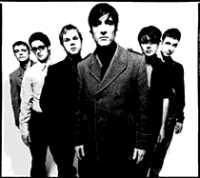Louis Elliot and Jonny Bull began their Brit-pop ventures in fall 1991 under the guise of Kinky Machine. With a dedicated, albeit small cult following, they broke into the U.K. Top Ten in 1992 and added a Manic Street Preachers tour to their credentials. 1993 brought a debut album and a 1995 sophomore effort, Bent; however, their style decreased in rarity as acts like Elastica exploded internationally. This, fueled by management and label woes, caused Kinky Machine to dissipate.
Early in 1997 Bull and Elliot, along with the latter's old friend and bassist Julian Taylor, drummer Pete Cuthbert, and Toby Hounsham, who responded to an advertisement placed in the Melody Maker, rejoined and formed Rialto. Their unusual name is traced back to a local U.K. (now bankrupt) theater chain. This cinematic reference is consistent with Elliot's fascination with films, soundtracks and scores, as they admit to being heavily influenced by cinema. They cite industry giants such as Elvis Costello, Lloyd Cole, Leonard Cohen, Elliot Smith, Brian Wilson, Ennio Morricone and John Barry as influences and objects of their musical admiration.Second drummer Anthony Christmas is a major contributor to this band's unusual sound, following the musical footsteps of Phil Spector and Adam and the Ants with two simultaneous, equi-balanced drummers. Given an eight-track home studio by their recording company, they emerged late in 1997 (under Bull's production talents and Elliot's lyrical guidance) with a new, innovativ e signature sound and contagious tunes chock full of script-like, empathetic tales.
In 1997 they produced their first singles, "When We're Together" and "Untouchable." The latter was re-released in January 1998; it quickly penetrated the Top 20 and was soon accompanied by their next Single, "Dream Another Dream." Despite their proven success and much anticipated arrival of their self-titled debut album, East-West Records dropped them. China Records, the label under which Morcheeba rose to fame, released Rialto's album in July 1998. The six-track Girl on a Train followed two years later, receiving accolades from NME and Q. By the time Rialto gathered to make a second album, Hounsham had left the group. Rialto was now a four-piece and they spent most of 2001 perfecting electronic sounds for Night on Earth, which was issued in March 2002.
Source: http://www.hiponline.com/artist/music/r/rialto/index.html
